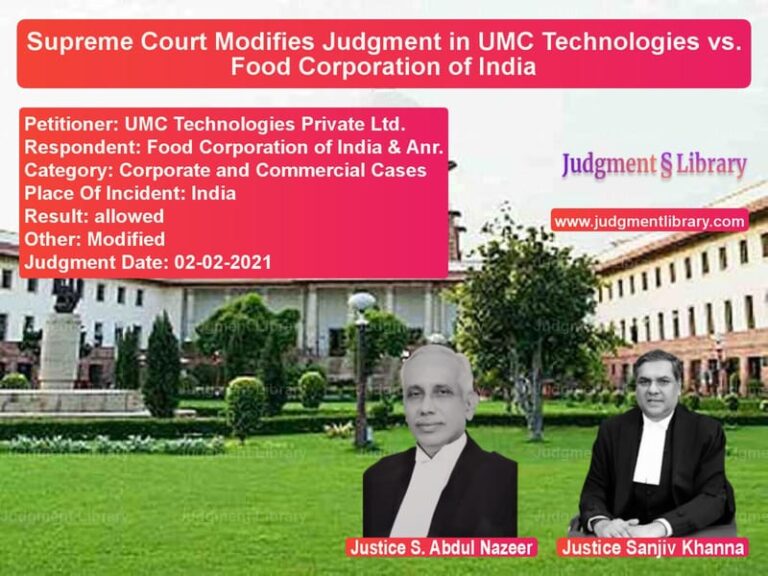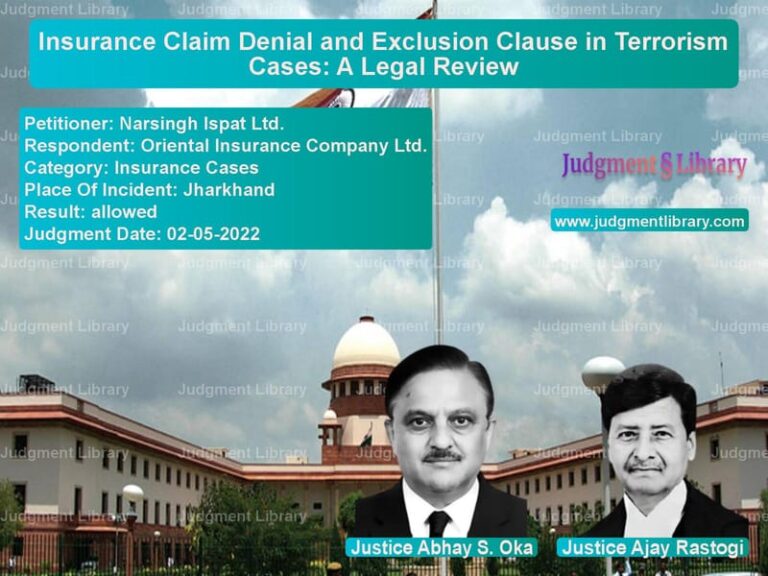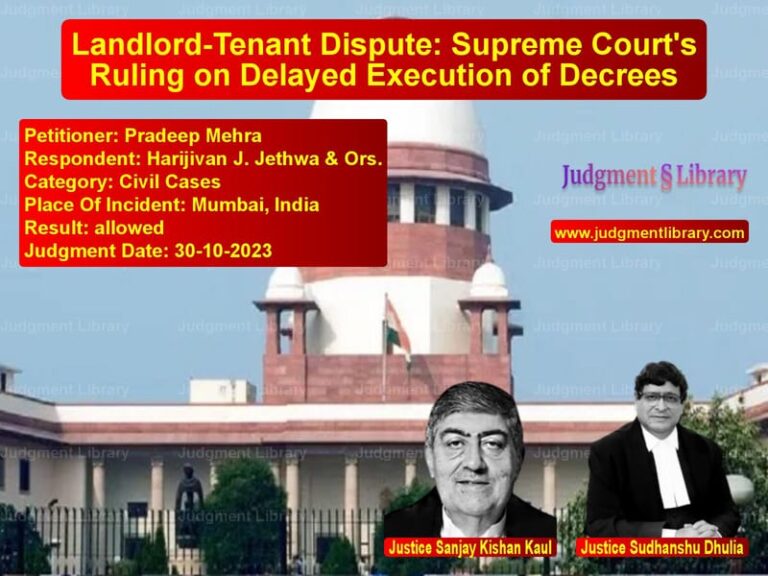Property Dispute and Unregistered Agreements: Supreme Court Rules on Ownership and Possession
The case of Shakeel Ahmed v. Syed Akhlaq Hussain revolves around a property dispute where the key legal question was whether ownership of immovable property could be claimed based on unregistered agreements. The Supreme Court’s ruling in this case reinforces the importance of registered documents in property transactions and the limitations of oral gifts (Hiba) under property law.
Background of the Case
The appellant, Shakeel Ahmed, was in possession of the disputed property. The respondent, Syed Akhlaq Hussain, filed a suit for possession and mesne profits based on documents such as a Power of Attorney, an Agreement to Sell, an Affidavit, and a Will executed in his favor. The Trial Court ruled in favor of the respondent, granting a decree for possession and mesne profits. This decision was later upheld by the Delhi High Court.
Shakeel Ahmed, however, challenged the ruling in the Supreme Court, arguing that he was the rightful owner of the property, having received it through a Hiba (oral gift) from his brother, Laiq Ahmed.
Legal Issues Raised
The case primarily focused on the following legal issues:
- Whether an unregistered Agreement to Sell, Power of Attorney, and Affidavit confer ownership rights.
- Whether a suit for possession can be maintained based on such documents.
- Whether the appellant had successfully established ownership through Hiba.
Findings of the Supreme Court
1. Unregistered Documents Do Not Confer Ownership
The Supreme Court reiterated the well-established legal principle that an unregistered Agreement to Sell does not confer ownership rights. The Court cited the Registration Act, 1908 and the Transfer of Property Act, 1882, which mandate that transactions involving immovable property above a certain value must be registered to be legally enforceable.
“The Registration Act, 1908 clearly provides that a document which requires compulsory registration under the Act would not confer any right, much less a legally enforceable right to approach a Court of Law on its basis.”
The Court further emphasized that even if these documents had been registered, they would not automatically confer ownership. At best, a registered Agreement to Sell could form the basis for seeking specific performance, but it would not itself transfer title.
2. No Title Can Be Claimed Under Power of Attorney
The respondent had also relied on a Power of Attorney executed in his favor. The Supreme Court rejected this argument, citing its earlier ruling in Suraj Lamps & Industries Pvt. Ltd. v. State of Haryana (2011), which held that property transactions conducted through Power of Attorney instead of registered sale deeds are legally invalid.
3. Oral Gift (Hiba) Must Be Proven with Cogent Evidence
The appellant argued that he had acquired the property through Hiba (oral gift) from his brother. However, the Supreme Court found that he had failed to establish this claim with reliable evidence. The Court emphasized that:
- Hiba requires proof of intention, acceptance, and delivery of possession.
- The appellant’s evidence was insufficient to prove that these essential elements were fulfilled.
- The possession of the property alone does not automatically establish ownership through Hiba.
Final Judgment
The Supreme Court ruled in favor of the respondent, affirming the possession and mesne profits decree. It held:
“The impugned judgment deserves to be set aside and the suit deserves to be dismissed.”
The Court clarified that mere possession does not grant ownership and that unregistered documents cannot serve as the basis for claiming immovable property.
Key Takeaways from the Judgment
1. Importance of Registered Documents
This ruling reinforces that property transactions must be conducted through registered documents to be legally valid.
2. Power of Attorney Cannot Transfer Ownership
Property buyers should ensure they obtain a proper sale deed rather than relying on Power of Attorney transactions.
3. Oral Gifts Must Be Substantiated
The burden of proof in Hiba cases lies with the claimant, who must demonstrate acceptance and possession beyond mere occupation.
Conclusion
The Supreme Court’s judgment in this case sets a crucial precedent in property law, reaffirming that ownership of immovable property cannot be claimed based on unregistered documents. It highlights the need for due diligence in property transactions and reinforces the importance of registration under the law.
Petitioner Name: Shakeel Ahmed.Respondent Name: Syed Akhlaq Hussain.Judgment By: Justice Vikram Nath, Justice Rajesh Bindal.Place Of Incident: Delhi.Judgment Date: 31-10-2023.
Don’t miss out on the full details! Download the complete judgment in PDF format below and gain valuable insights instantly!
Download Judgment: shakeel-ahmed-vs-syed-akhlaq-hussain-supreme-court-of-india-judgment-dated-31-10-2023.pdf
Directly Download Judgment: Directly download this Judgment
See all petitions in Property Disputes
See all petitions in Specific Performance
See all petitions in Contract Disputes
See all petitions in Judgment by Vikram Nath
See all petitions in Judgment by Rajesh Bindal
See all petitions in allowed
See all petitions in Quashed
See all petitions in supreme court of India judgments October 2023
See all petitions in 2023 judgments
See all posts in Civil Cases Category
See all allowed petitions in Civil Cases Category
See all Dismissed petitions in Civil Cases Category
See all partially allowed petitions in Civil Cases Category







